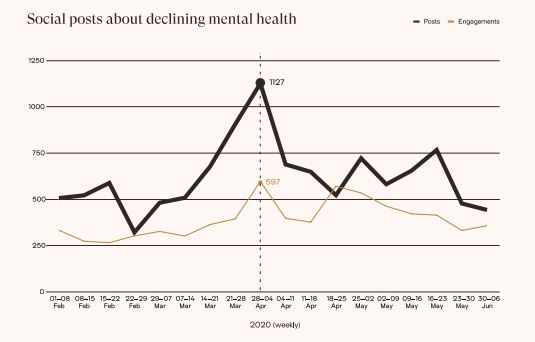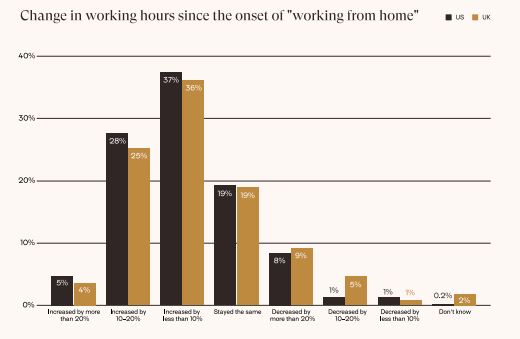COVID-19 put a spotlight on mental health, says Koa Health
The pandemic has provided an opportunity to focus on employee mental health.
Why You Should Care
COVID-19 and the shift to remote working pushed mental health into focus, according to research by Koa Health.
A decline in mental health in the pandemic was counteracted by a 72% increase in wellbeing support from employers.
However, Koa Health calls on companies to continue this focus on staff mental health support in the long-term.
Mental health has been slowly creeping up the workplace agenda over the past few years.
However, the shift to remote working as a result of the pandemic placed a spotlight on the need for organizations to better consider how they support their newly distributed workforce.
Research by digital mental wellbeing platform Koa Health found there was a 44% decline in the mental health of individuals living in the US and the UK between February and March 2020. This figured was based on an online social listening survey carried out by Pulsar.

Credit: Koa Health.
The increase in mental health concerns led to more employees asking for help – with 60% of 1,000 HR managers participating in a Koa Health commissioned Censuswide survey reporting they saw an uptick in demand for mental wellbeing support from their staff.
This pushed HR departments to significantly increase the amount of time they dedicated to mental wellbeing support – there was a 33% growth on pre-pandemic levels. In addition, 72% of UK companies surveyed increased their level of mental health support to employees in the pandemic.
The pandemic wages on
As the pandemic continued and it became clear that working from home was going to last much longer than just a few weeks, unfortunately, the focus on employee’s mental health starting to decline, according to Koa Health’s report.
With a continued lack of visibility of employees because of remote working, 56% of HR managers said mental health support started to slip through the cracks. It is clear that HR teams were struggling to actually get to the bottom of how staff were coping with the pandemic and working from home.
Linked to this, there has been a decline in work-life balance. Stress and burnout are at all time high during this pandemic as employees have started to work longer hours. As the pandemic waged on, Koa Health’s social listening survey found that individuals actually started to spend less and less time on things that improve their wellbeing – like video calls with friends or picking up new hobbies.

Credit: Koa Health.
HR managers told Koa Health they tried to tackle this overtime trend by communicating staff policies (48%), ensuring managers set good examples (45%) and tracking working hours (47%).
However, clearly these attempts did no go far enough. This could be linked to the fact that there is enduring stigma around mental health; Koa Health’ research found that 58% of HR managers surveyed stated that employees didn’t feel comfortable discussing their mental wellbeing concerns at work.
What does the future look like?
COVID-19 may have brought mental wellbeing further into the spotlight, but there is a danger that this a one step forward, two steps back situation.
This is because Koa Health’s Censuswide survey found that 48% of HR managers noted that mental health is still not recognized as a cultural priority by their organization. This was particularly the case in larger organizations.
Koa Health CEO Dr Oliver Harrison said: “While our report found that many have risen to the challenge, it’s alarming that many organizations still do not see mental health as a cultural priority at their organization.
“Having gone through so much change and turmoil in the past 15 months, organizations must listen to their employees and take action to address their mental health concerns.”
While 70% of HR managers are planning to increase the level of mental wellbeing support in the future, there were still some (4%) that said they intended to reduce it once the pandemic ends.
Whereas, instead, the pandemic should be seen as an opportunity to break through the stigma that continues to surround mental wellbeing in the workplace.
Tom Insell, Koa Health’s scineitific advisory board chair, stated that things have “change if we are to avoid the long-term impact that poor mental health can have on individuals, organizations and indeed society at large.
“Embedding mental health support as a long-term cultural priority at organizations is going to require serious cooperation from within businesses and across whole sectors.”
Harrison concluded: “Organizations’ response to the aftermath of the pandemic and this shift to a new normal will make or break individuals’ mental health, not to mention company productivity.
“With economic recovery predicted to be slow amid ongoing uncertainty, ensuring all workforces are as productive as possible will be a high priority for HR managers over the coming year.”
As companies consider how to do this, Koa Health state that companies need to be aware that there is no one-size-fits-all approach to tackling employee mental wellbeing. Instead, success can be achieved by personalizing and tailoring mental health benefits to individual needs.
Sign up to the UNLEASH Newsletter
Get the Editor’s picks of the week delivered straight to your inbox!

Chief Reporter
Allie is an award-winning business journalist and can be reached at alexandra@unleash.ai.
